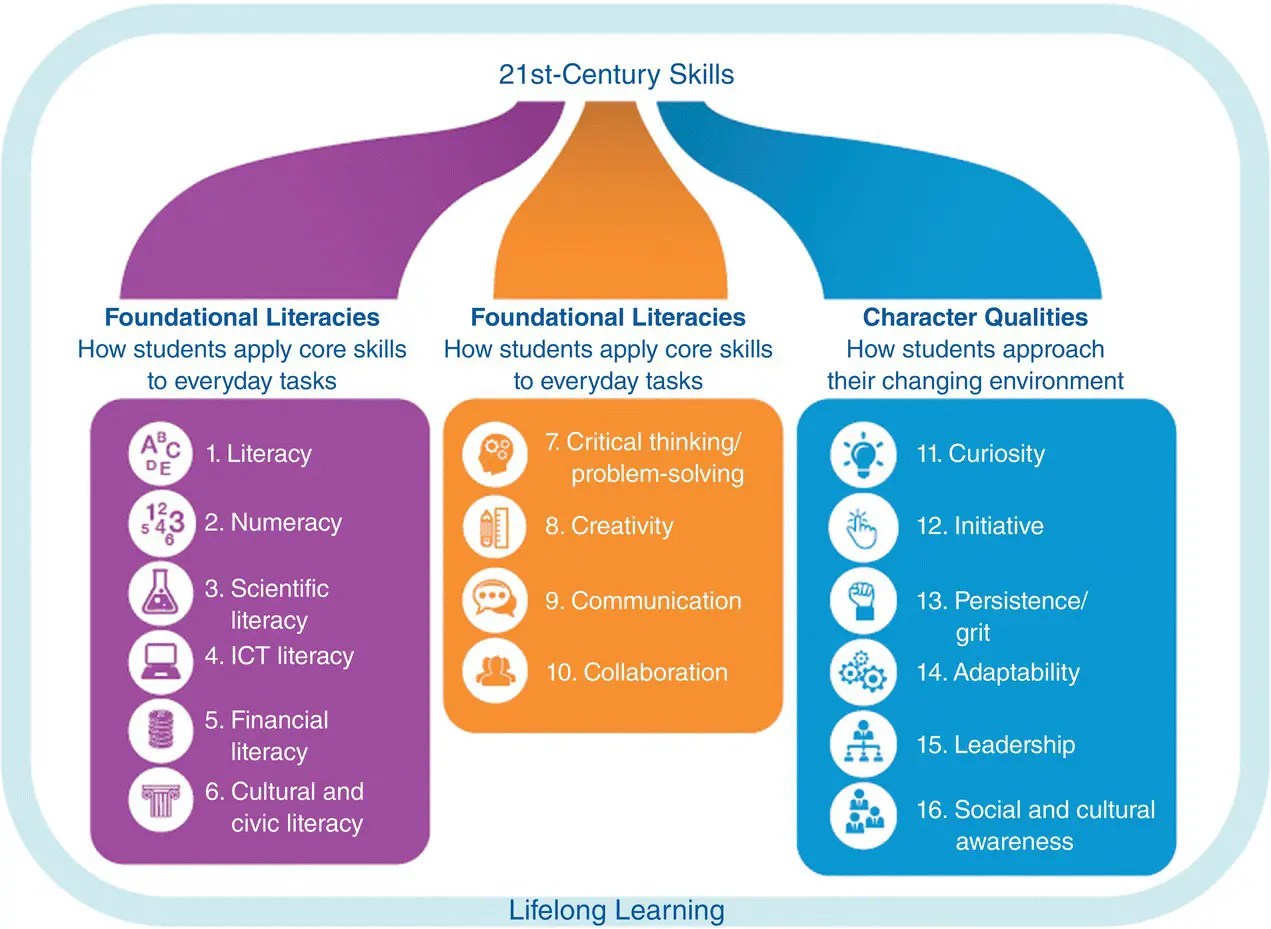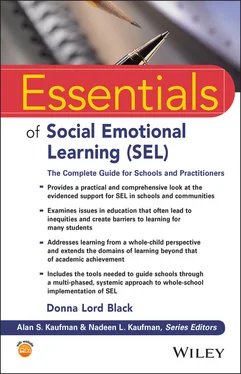Donna Lord Black - Essentials of Social Emotional Learning (SEL)
Здесь есть возможность читать онлайн «Donna Lord Black - Essentials of Social Emotional Learning (SEL)» — ознакомительный отрывок электронной книги совершенно бесплатно, а после прочтения отрывка купить полную версию. В некоторых случаях можно слушать аудио, скачать через торрент в формате fb2 и присутствует краткое содержание. Жанр: unrecognised, на английском языке. Описание произведения, (предисловие) а так же отзывы посетителей доступны на портале библиотеки ЛибКат.
- Название:Essentials of Social Emotional Learning (SEL)
- Автор:
- Жанр:
- Год:неизвестен
- ISBN:нет данных
- Рейтинг книги:5 / 5. Голосов: 1
-
Избранное:Добавить в избранное
- Отзывы:
-
Ваша оценка:
- 100
- 1
- 2
- 3
- 4
- 5
Essentials of Social Emotional Learning (SEL): краткое содержание, описание и аннотация
Предлагаем к чтению аннотацию, описание, краткое содержание или предисловие (зависит от того, что написал сам автор книги «Essentials of Social Emotional Learning (SEL)»). Если вы не нашли необходимую информацию о книге — напишите в комментариях, мы постараемся отыскать её.
Essentials of Social Emotional Learning (SEL): The Complete Guide for Schools and Practitioners
Essentials of Social Emotional Learning (SEL)
Essentials of Emotional Learning (SEL
Essentials of Social Emotional Learning (SEL) — читать онлайн ознакомительный отрывок
Ниже представлен текст книги, разбитый по страницам. Система сохранения места последней прочитанной страницы, позволяет с удобством читать онлайн бесплатно книгу «Essentials of Social Emotional Learning (SEL)», без необходимости каждый раз заново искать на чём Вы остановились. Поставьте закладку, и сможете в любой момент перейти на страницу, на которой закончили чтение.
Интервал:
Закладка:
Elias and Weissberg later collaborated with seven other authors to coauthor Promoting Social and Emotional Learning: Guidelines for Educators . The publication of this book by the ASCD in 1997 established and defined the field of SEL. However, it wasn’t until the release of Daniel Goleman’s previously mentioned book on emotional intelligence that the concept of SEL became prominent in popular culture.
Formation of the Aspen Institute’s National Commission on Social, Emotional, and Academic Development
More recently, in November 2016, the Aspen Institute launched the National Commission on Social, Emotional, and Academic Development to explore how schools can fully integrate SEL into policies and instructional practices that have traditionally emphasized academics. During the two years after it was formed, the Commission met and talked with young people, parents, teachers, school and district leaders, community leaders, and other experts to investigate how students learn. The Commission also reviewed more than two decades of research across the fields of psychology, social science, and brain science. The Commission published four reports and related resources, with the fourth and final report acknowledging how learning is deeply linked across the social, emotional, and cognitive dimensions. This final report emphasized that schools must rethink how they teach and educate students and must focus on educating the whole child. According to the executive summary of the report, “The promotion of social, emotional, and academic learning is not a shifting fad; it is the substance of education itself” (National Commission on Social, Emotional, and Academic Development, 2019, p. 1). A set of recommendations across six broad categories was included in the full report and identified, among others, such things as transforming the learning environment to ensure safety and support for all students, embedding social and emotional teaching with academics and schoolwide practices, and building adult expertise in child development (National Commission on Social, Emotional, and Academic Development, 2019). A full list of the recommendations can be found in Rapid Reference 2.7.
Rapid Reference 2.7 Recommendations from the Aspen Institute’s National Commission on Social, Emotional, and Academic Development, From a Nation at Risk to a Nation at Hope (January 2019)
The Commission’s recommendations were provided for the purpose of accelerating efforts in state and local communities across the six broad categories listed here. The recommendations were not intended to be sequential, and it was not assumed that communities would pursue every strategy.
1 Set a clear vision that broadens the definition of student success to prioritize the whole child.
2 Transform learning settings so they are safe and supportive for all young people.
3 Change instruction to teach students social, emotional, and cognitive skills; embed these skills in academics and schoolwide practices.
4 Build adult expertise in child development.
5 Align resources and leverage partners in the community to address the whole child.
6 Forge closer connections between research and practice by shifting the paradigm for how research gets done.
Since Plato first introduced the concept of SEL more than 2,000 years ago, modern education has evolved into an immensely complex system of programs, policies, curriculums, and funding formulas. In addition, student populations are increasingly more diverse, leaving school systems to struggle with meeting the needs of all students. In his writings, Plato wrote about education as a means to achieve justice, both individual and social justice. He believed that all people could exist in harmony if society provided them with an equal educational opportunity. Without this, society would be unjust because he believed it would be run by unqualified people, resulting in tyranny. While modern education somewhat mirrors Plato’s beliefs, it continues to struggle with issues of educational equity and social justice. However, an increased focus on the need to prepare children for a global workforce has shifted these priorities to the forefront.
Preparation for a Global Workforce: World Economic Forum’s Emphasis on SEL
Prior to and since the publication of the report from the National Commission on Social, Emotional, and Academic Development, interest in and demand for SEL in schools have surged dramatically. This surge has been due, in part, to a strong recognition that students are not being prepared for the workforce of the future. It is projected that 65% of children entering grade school will work in jobs that do not currently exist (Davison, 2013). It is further projected that this emerging labor market will require workers to have skills that have not been the traditional focus in the past. Skills in social and emotional proficiency will be the skills most demanded by these jobs of the future (Levy & Murnane, 2013). According to the World Economic Forum, there are 16 critical skills that young people will need for the future workforce, and these skills extend well beyond the literacy skills that are the primary focus of most schools today. In fact, only six of these necessary skills are considered literacy skills. The remaining 10 skills are related to character qualities and competencies needed for dealing with complex challenges (World Economic Forum, 2016). A description of these 16 skills can be found in Rapid Reference 2.8. While these skills are important for workforce success, they are equally important in preparing students for success in life. In fact, the Organization for Economic Co‐operation and Development (OECD) reports that today’s children will need a balanced set of social, emotional, and cognitive skills in order to face the challenges of the twenty‐first century and achieve positive life outcomes (OECD, 2015).
Rapid Reference 2.8 Critical Skills for the Twenty‐First Century

Source : World Economic Forum, New Vision for Education: Fostering Social and Emotional Learning Through Technology , March 2016. Reprinted with permission.
CONCLUSIONS
A review of historical events demonstrates the importance of social and emotional development in educating young people, and how important this area of development is in guiding future educational efforts. Awareness of SEL’s importance has gained widespread recognition and it is now valued as being of equal importance in educating young people as cognitive development and academic achievement. Recent societal events confirm this importance, as do studies on future workforce needs. Unfortunately, policy efforts have been slow to adapt to the mounting evidence for SEL, although recent events suggest this may be evolving more positively. As school systems struggle to prepare young people for success in life and to meet the demands of a changing society, they should not ignore what history has demonstrated. In the case of SEL, history clearly has demonstrated that social and emotional development is a critical domain in the learning process and should be viewed as a natural and necessary component of learning.
TEST YOURSELF
1 The knowledge we gain from the history of SEL helps usconfirm existing problems.advance and promote SEL in schools.memorize important facts about SEL.
2 The recent event that was most responsible for propelling SEL into the spotlight wasthe COVID‐19 pandemic of 2020.school safety concerns.trauma and adversity.
Читать дальшеИнтервал:
Закладка:
Похожие книги на «Essentials of Social Emotional Learning (SEL)»
Представляем Вашему вниманию похожие книги на «Essentials of Social Emotional Learning (SEL)» списком для выбора. Мы отобрали схожую по названию и смыслу литературу в надежде предоставить читателям больше вариантов отыскать новые, интересные, ещё непрочитанные произведения.
Обсуждение, отзывы о книге «Essentials of Social Emotional Learning (SEL)» и просто собственные мнения читателей. Оставьте ваши комментарии, напишите, что Вы думаете о произведении, его смысле или главных героях. Укажите что конкретно понравилось, а что нет, и почему Вы так считаете.












